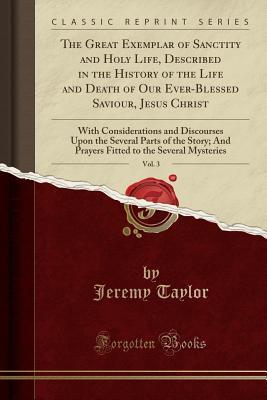Excerpt from The Great Exemplar of Sanctity and Holy Life, Described in the History of the Life and Death of Our Ever-Blessed Saviour, Jesus Christ, Vol. 3: With Considerations and Discourses Upon the Several Parts of the Story; And Prayers Fitted to the Several Mysteries
Galilee, from J udea, from Jerusalem, from Id umasa, from beyond Jordan, from about Tyre and Sidon who hearing the report of his miraculous power to cure all diseases by the word of his mouth, or the touch of his hand, or the handling his garment, came with their ambulatory hospital of their sick and possessed; and they pressed on him, but to touch him, and were all immediately cured. The devils confessing publicly, that he was the Son of God, till they were, upon all such occasions, re strained and compelled to silence.
About the Publisher
Forgotten Books publishes hundreds of thousands of rare and classic books. Find more at www.forgottenbooks.comwww.forgottenbooks.com
This book is a reproduction of an important historical work. Forgotten Books uses state-of-the-art technology to digitally reconstruct the work, preserving the original format whilst repairing imperfections present in the aged copy. In rare cases, an imperfection in the original, such as a blemish or missing page, may be replicated in our edition. We do, however, repair the vast majority of imperfections successfully; any imperfections that remain are intentionally left to preserve the state of such historical works.
Galilee, from J udea, from Jerusalem, from Id umasa, from beyond Jordan, from about Tyre and Sidon who hearing the report of his miraculous power to cure all diseases by the word of his mouth, or the touch of his hand, or the handling his garment, came with their ambulatory hospital of their sick and possessed; and they pressed on him, but to touch him, and were all immediately cured. The devils confessing publicly, that he was the Son of God, till they were, upon all such occasions, re strained and compelled to silence.
About the Publisher
Forgotten Books publishes hundreds of thousands of rare and classic books. Find more at www.forgottenbooks.comwww.forgottenbooks.com
This book is a reproduction of an important historical work. Forgotten Books uses state-of-the-art technology to digitally reconstruct the work, preserving the original format whilst repairing imperfections present in the aged copy. In rare cases, an imperfection in the original, such as a blemish or missing page, may be replicated in our edition. We do, however, repair the vast majority of imperfections successfully; any imperfections that remain are intentionally left to preserve the state of such historical works.
BUY NOW
Paperback, 404 pages
Published April 22nd 2018 by Forgotten Books
© 2025 Bibleportal.com 版权所有.

Jeremy Taylor was a clergyman in the Church of England who achieved fame as an author during The Protectorate of Oliver Cromwell. He is sometimes known as the "Shakespeare of Divines" for his poetic style of expression and was often presented as a model of prose writing. He is remembered in the Church of England's calendar of saints with a Lesser Festival on 13 August.
He went on to become chaplain in ordinary to King Charles I as a result of Laud's sponsorship. This made him politically suspect when Laud was tried for treason and executed in 1645 by the Puritan Parliament during the English Civil War. After the Parliamentary victory over the King, he was briefly imprisoned several times.
Eventually, he was allowed to live quietly in Wales, where he became the private chaplain of the Earl of Carbery. At the Restoration, his political star was on the rise, and he was made Bishop of Down and Connor in Ireland. He also became vice-chancellor of the University of Dublin.
Taylor's fame has been maintained by the popularity of his sermons and devotional writings rather than by his influence as a theologian or his importance as an ecclesiastic.
... Show more